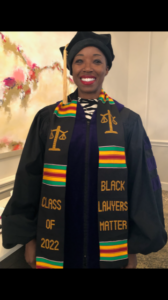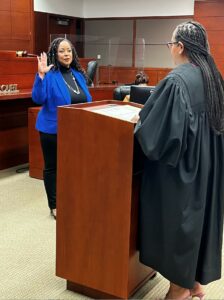Many states make it difficult for out-of-state lawyers from state-accredited law schools to be admitted to practice. The Colleges of Law alumnus Daniel Knight reveals how he became barred in six states (and counting).
Like many graduates of The Colleges of Law, Daniel Knight, J.D., had built a life and career before he ever applied to law school. He started a construction company shortly after high school, and, while he was running that business, he earned undergraduate and graduate degrees in accounting before enrolling at The Colleges of Law.
Upon graduation, Knight realized he could not support his family on an associate’s pay, so he hung up his shingle. “I think I had my bar number for about four days before I filed my first lawsuit,” Knight says.
After five years of practicing law, Knight and his wife took a trip to Maui. It inspired him to look into the rules for practicing law in Hawaii, which stated that the applicant must be a graduate of an American Bar Association-accredited school. That might have been the end of the story, but Knight noticed there was another option that said an applicant could become eligible if they “demonstrate the active practice of law.”
It was the pursuit of this second option that began Knight’s quest to become barred in six states (and counting). Over the course of his efforts, he learned a great deal about the process, how states are similar and how they are different in admitting lawyers from other states to their bar. (For more on the differences in practicing in other states with an ABA-accredited degree as opposed to a state-accredited school, read “ABA vs. Cal Bar schools: What’s the difference?”)
Daniel Knight’s Tips for Becoming Barred to Practice Law in Multiple States
Tip 1: Ask why not
As Knight began his effort in each state, he asked himself why anyone should refuse to accept him to the bar when he had demonstrated that he has all the necessary qualifications.
Having graduated from a state-accredited institution, Knight has had Harvard Law School and Yale Law School graduates look down their noses at him but then lose to him in court, so he proved that he was qualified and skilled enough to practice anywhere.
To make a successful case to practice law in a different state, lawyers should be responsive to the bar analysts in each state with requests for documentation, which might include driving records, credit reports, and caption sheets.
Tip 2: Accrue documented time practicing law as soon and as often as possible.
One of the most valuable points in support of Knight’s effort to be admitted to other state bars was his documented accrued practice time. He went into private practice straight out of law school and demonstrated through caption sheets the cases he had argued in court.
“I didn’t know at the time how important it would be to have an active practice of law that was documented,” Knight says. “I found that no matter how many times I’ve been told no, when they learn I’ve been practicing successfully in California, which has one of the highest bar cut scores in the country, they suddenly stopped worrying as much about their rules.”
Tip 3: Ask to speak to the boss.
When Knight contacted the Hawaii bar association saying he would like to take advantage of their practice exemption, the analyst told him he had to be a graduate of an ABA-accredited school. Instead of backing down, Knight asked the analyst for their boss’s email. The boss told Knight that indeed there is a provision, rarely exercised, for a practice equivalency.
Knight says he realized early that some who work in state bar offices find it much easier to send back a quick answer that sounds good and doesn’t require any research. “The first time you get told no, do not stop,” he says. “Every state that I’ve gone into, they’ve told me that it was not possible.”
Tip 4: Learn the rules and take advantage of what you learn.
Knight says that often the states’ analysts don’t even know the rules for barring lawyers from out of state. Through time and effort, Knight learned that each state has different procedures, and all of them require a lot of documentation. However, much of what the states require is very similar, and each state’s bar exam, as well as the Uniform Bar Exam, is only slightly different from another.
After he submitted all the necessary paperwork to the Hawaii State Bar Association, the analyst handling his case told him, “We’ll see if we’re going to accept this,” to which Knight replied, “You will accept it,” pointing out the HBSA’s own rule on the matter.
Tip 5: Be polite but persistent.
After applying in Texas and not hearing back for several months, Knight sent an email to the State Bar of Texas saying, “I don’t mean to pester you, but is there someone who can review my application?” A short time later, a Texas state official replied, apologizing to Knight for not getting back to him sooner and telling him he was approved.
Knight says there’s a fine art of not pestering bar analysts enough to anger them but also making a point of checking in, because sometimes they do forget about you.
Thanks to his efforts, Knight has a thriving law practice with offices in California, Hawaii, and Texas. The process of pursuing bar admission taught Knight valuable lessons about his own abilities as a lawyer and how his practice appears to bar analysts in each of the states he approached. Any lawyer who seeks to practice in other states will find Knight’s experience a valuable road map to follow. Those who are not should recognize the value in making sure all their records and accounting are current should they wish to take such a step in the future.
To learn more about the J.D., Hybrid J.D., and M.A. in Law programs at The Colleges of Law, fill out the form below.
—




